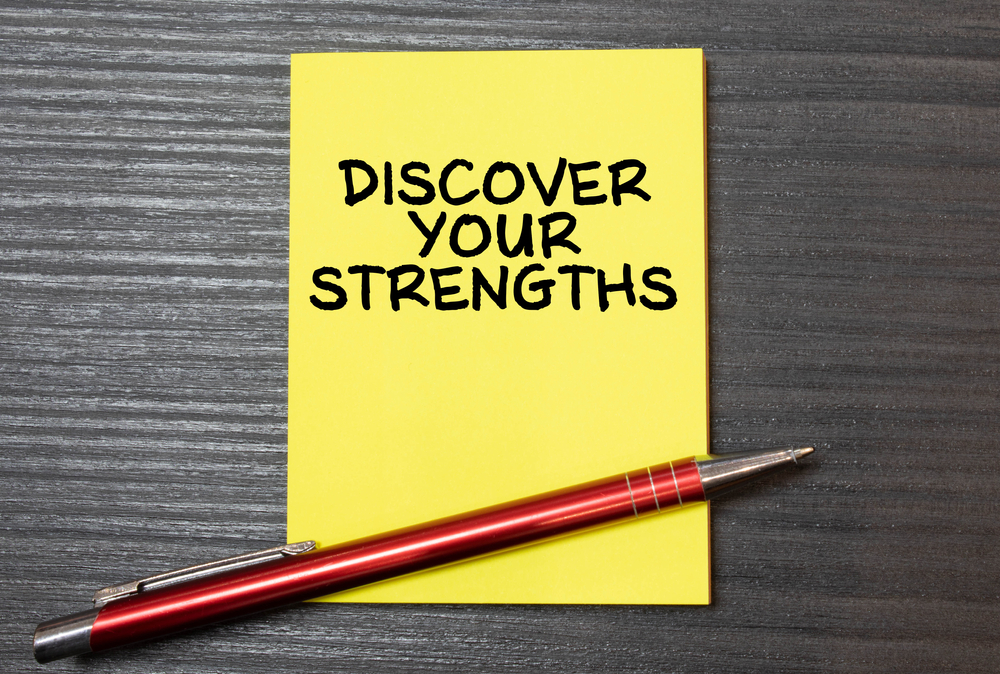Strengths discovery: unleashing your full potential
Understanding and harnessing your strengths is a powerful tool for both personal and professional growth. Strengths discovery is the process of identifying and leveraging your unique characteristics and talents. It involves recognising your natural abilities and using them to your advantage, rather than focusing on fixing weaknesses. By uncovering your strengths, you can maximise your performance and wellbeing by playing to them more.

People who use their strengths for just ten hours a week are:
- Six times more likely to be engaged at work
- 8% more productive
- 15% less likely to quit
- Three times more likely to have an excellent quality of life
People experience:
- 21% less worry
- 16% less stress
- 9% less anger
- 17% less sadness
Source: Allan 2014, Asplund 2012, Csikszentmihalyi 1990, Gallup 2015, Harzer 2012, Lavy 2017
The process of strengths discovery begins with self-reflection and introspection. It involves identifying activities or tasks that energise and engage us, as well as those in which we excel effortlessly. It’s about recognising the qualities that set us apart and bring us joy. By recognising our strengths, we can strategically align them with our goals and aspirations, making informed decisions about the paths we choose to pursue. This self-awareness empowers us to play to our strengths, seek opportunities that maximise our potential, and ultimately thrive in our chosen endeavours.
In addition, strengths discovery promotes a positive mindset (our 90 second article on mindset can be found here). Focusing on your strengths allows you to approach challenges with confidence and resilience. You learn to see setbacks as opportunities for growth and utilise your strengths to overcome any obstacles. This mindset shift empowers you to achieve greater success and overcome limitations that may have held you back in the past.
Strengths discovery is not just about individual growth. In a team context it goes beyond simply identifying individual strengths; it involves understanding how those strengths synergise and complement each other. A skilled business coach can guide a team through the process, facilitating workshops and assessments to uncover collective strengths. This collaborative approach helps build a culture of appreciation, so that team members recognise and value each other’s contributions.
Through ongoing coaching sessions, team members can also receive valuable feedback, identify areas for growth, and cultivate new skills that enhance their own performance and their contribution to the organisation.
Strengths discovery can be a transformative process for both individuals and teams. By harnessing the unique talents and abilities of team members – rather than focusing on individual and collective weaknesses and trying to fix them – it is possible to unleash their full potential, foster collaboration, and drive exceptional performance.
Focusing on strengths during performance conversations leads to a 36.4% increase in motivation and performance immediately following the conversation, whereas focusing on weaknesses decreases motivation and performance following the conversation by 28.6% (Corporate Leadership Council, 2002).
How can we discover our strengths?
Our innate strengths often come so naturally to us that we can take them for granted. What we feel is easy and enjoyable is not necessarily the case for everyone. It is therefore helpful to engage support from those who know you well so that they can help you discover your strengths.
Here are some questions you can discuss to help you identify your strengths, along with a list of strengths you can refer to (not exhaustive):
- What role do I tend to play in my team at work / with my friends and family?
- How do I add value to team discussions / family conversations or disagreements?
- Recall a time when you have seen me at my happiest, what was I doing?
- What did I enjoy most and excel at during school / college / uni, and why?
| Adventurous | Analytical | Appreciative |
| Approachable | Attentive | Brave |
| Calm | Caring | Conscientious |
| Considered | Co-operative | Creative |
| Curious | Decisive | Dependable |
| Detailed | Determined | Empathetic |
| Energetic | Engaging | Fair |
| Flexible | Focused | Generous |
| Guiding | Hopeful | Humorous |
| Independent | Insightful | Modest |
| Open-minded | Organised | Passionate |
| Patient | Playful | Positive |
| Practical | Principled | Resilient |
| Rigorous | Sincere | Spontaneous |
| Strategic | Supportive | Thoughtful |
| Understanding | Warm | Wise |
When we are talking about a time when we have been playing to our strengths, it can be obvious for others to spot. Our eyes light up, we get more animated, we are often smiling and our tone of voice is light and excitable. Here are a few questions that others could ask you, and be on the lookout for when you ‘light’ up:
- What was your best day in the last week and why?
- What do you do well (inside and outside work)?
- When did you last get absorbed in something and lose track of time?
- What would your perfect job be and why?
- What would you like to do more of in future? Why?
If you would like to try a test to help you determine your own strengths, here are a couple of suggestions:
Free, quick option:
https://high5test.com/cliftonstrengths-free/
Free, more in-depth option:
https://www.authentichappiness.sas.upenn.edu/user/login?destination=node/434
For further reading, this book also includes a code to enable you to take the Clifton Strengths Test:
https://www.amazon.co.uk/StrengthsFinder-2-0-Upgraded-Discover-Strengths/dp/159562015X
Article written by the MindBerry Team and Alison Thorogood (Certified Leadership & Development Trainer & Coach – ICF)


